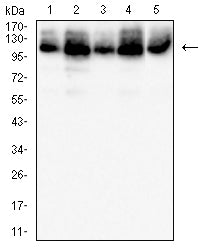
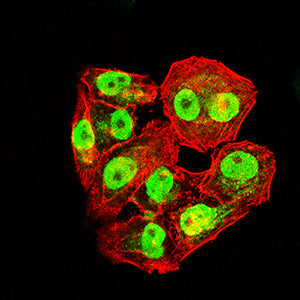
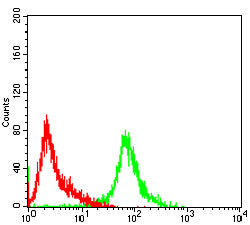
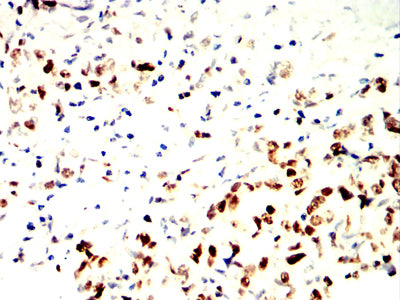
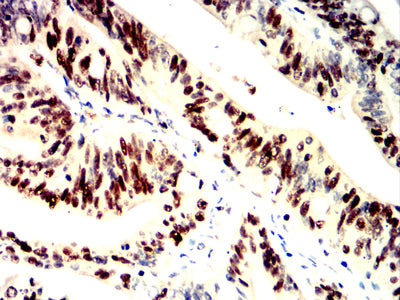
| WB | 1/500 - 1/2000 | Human,Rat,Monkey |
| IF | 咨询技术 | Human,Rat,Monkey |
| IHC | 1/200 - 1/1000 | Human,Rat,Monkey |
| ICC | 1/50 - 1/200 | Human,Rat,Monkey |
| FCM | 1/200 - 1/400 | Human,Rat,Monkey |
| Elisa | 咨询技术 | Human,Rat,Monkey |
| Aliases | HCC5; P1.h; RLFB; P1-MCM3 |
| Entrez GeneID | 4172 |
| clone | 1D4A3 |
| WB Predicted band size | 91kDa |
| Host/Isotype | Mouse IgG1 |
| Antibody Type | Primary antibody |
| Storage | Store at 4°C short term. Aliquot and store at -20°C long term. Avoid freeze/thaw cycles. |
| Species Reactivity | Human,Rat,Monkey |
| Immunogen | Purified recombinant fragment of human MCM3 expressed in E. Coli. |
| Formulation | Purified antibody in PBS with 0.05% sodium azide |
+ +
以下是关于MCM3抗体的3篇参考文献及其摘要概括:
1. **文献名称**:*"Immunohistochemical analysis of minichromosome maintenance protein 3 (MCM3) in human colorectal cancer tissues"*
**作者**:Giaginis et al.
**摘要**:该研究通过免疫组化技术分析了MCM3在结直肠癌组织中的表达水平,发现MCM3在癌细胞中显著高表达,并与肿瘤分期和患者不良预后相关,提示其可作为潜在的癌症生物标志物。
2. **文献名称**:*"MCM3 as a novel proliferation marker in human gliomas: Comparison with Ki-67"*
**作者**:Wharton et al.
**摘要**:本文比较了MCM3抗体与Ki-67在神经胶质瘤中的检测效果,发现MCM3在增殖细胞中的表达更敏感且稳定,建议其作为评估脑肿瘤细胞增殖活性的可靠指标。
3. **文献名称**:*"Cell cycle-regulated phosphorylation of MCM3: Role in chromatin binding and ATPase activity"*
**作者**:Ishimi et al.
**摘要**:研究探讨了MCM3在细胞周期中的磷酸化修饰及其功能,通过抗体检测发现其磷酸化状态影响与染色质的结合及ATP酶活性,揭示了MCM3在DNA复制起始中的调控机制。
4. **文献名称**:*"Expression of MCM3 in oral squamous cell carcinoma and its correlation with clinicopathological parameters"*
**作者**:Todorov et al.
**摘要**:该研究利用MCM3抗体检测口腔鳞癌组织,发现其表达水平与肿瘤侵袭性及淋巴结转移显著相关,支持MCM3作为口腔癌进展的预测因子。
这些文献涵盖了MCM3抗体在癌症诊断、增殖评估及分子机制研究中的应用。
MCM3 (Minichromosome Maintenance Complex Component 3) is a critical protein involved in DNA replication and cell cycle regulation. As part of the hexameric MCM2-7 complex, it functions as a DNA helicase, unwinding double-stranded DNA during replication initiation. MCM3 plays a key role in ensuring precise genome duplication by restricting DNA replication to once per cell cycle. Dysregulation of MCM3 has been linked to uncontrolled cell proliferation, a hallmark of cancer, making it a potential biomarker for tumorigenesis.
Antibodies targeting MCM3 are widely used in research to study DNA replication mechanisms, cell cycle progression, and cancer biology. They enable detection of MCM3 expression and localization in cells or tissues via techniques like Western blotting, immunohistochemistry (IHC), and immunofluorescence (IF). Elevated MCM3 levels are often observed in malignancies, correlating with poor prognosis, which underscores its utility in cancer diagnostics and prognostic assessments.
Commercially available MCM3 antibodies are typically validated for specificity across human, mouse, and rat samples. Researchers also use them to explore interactions with other replication licensing factors (e.g., Cdc6. ORC) or to assess replication stress responses. As a conserved component of the replication machinery, MCM3 antibodies contribute to both basic science and translational studies aiming to target replication vulnerabilities in cancer therapy.
×